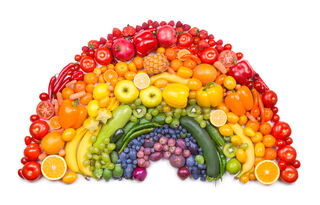Cognition
How Flavonoids Can Help Keep Your Brain Humming
Fiber and flavonoids can up your mental game. Here’s where to find them.
Posted August 12, 2021 Reviewed by Chloe Williams
Key points
- Gut microbes can affect one's mood, focus and cognition. Unbalanced populations of gut microbes can also influence cravings for unhealthy foods.
- Fiber can help rebalance gut microbes. Nutrients found in fruits and vegetables called flavonoids work in concert with fiber, a new study shows.
- A higher intake of flavonoids is linked to reduced cognitive decline over time. Flavonoids reduce inflammation and increase healthy bacteria.
The gut-brain connection is a story that just keeps giving. Remarkably, it shows how microbes in our gut can affect our mood, focus and cognition. I’ve written before about how potent this connection is. The association between gut issues and mental issues like depression and anxiety becomes clearer with each new study.

Microbes can churn out important molecules like butyrate that both nourish and heal the gut lining, thus lowering inflammation throughout the body. Microbes can also secrete psychoactive chemicals like dopamine, serotonin, and GABA that are used by the brain to transmit signals. Like our brain cells, microbes likely use these molecules to communicate among themselves. Surprisingly, they may use them to communicate with us as well. In fact, your cravings may actually have roots in the desire of your microbes for specific sugary treats like donuts or candy bars.
That’s right, when it comes to bad food choices, it is possible that your microbes make you do it. And satisfying those cravings can lead to a population explosion of these slacker microbes, leading to further mischief. If your gut microbes get unbalanced, they may go rogue and make you sick, anxious or depressed – while still craving donuts.
So how do you keep your gut microbes balanced and happy? That turns out to be as easy to describe as it is difficult to execute. The trick is to feed your good microbes and starve your bad microbes. If you think I’m going to tell you to swap your donuts for actual plant-based food, you are correct.
Veggies and fruit, unlike donuts, contain fiber that is coveted by your good microbes. Sadly, the standard American diet is very low in fiber. Incredibly, we purposefully extract it from our food! That likely explains the epidemics of obesity, diabetes, and depression that have clouded the last 50 years. It turns out that fiber can improve your health and your mood, and here we introduce some brand-new characters to this amazing story.
The Positive Cognitive Effects of Flavonoids
A new study presents compelling evidence that another set of nutrients can work in concert with fiber. They are called flavonoids. As the name implies, they give flavor to fruits and veggies. Best of all, they can be quickly identified by the color they impart. Think of red apples, purple beets, and orange oranges. These colors and flavors are all due to flavonoids. Your mother told you these were better for you than Oreos, and she was right. But then she may have poured you a glass of apple juice and missed the target. That’s because many manufacturers peel the fruit before juicing and thus toss away the nutritious flavonoids.
This new analysis by Walter Willett and his Harvard colleagues was based on a couple of large, long-term studies. It combined two databases of female and male health professionals that reached back to the mid-1980s. They were able to look at over 75,000 people, which granted them a great deal of statistical power. They found that the higher the intake of flavonoids, the lower the cognitive decline over time. Large longitudinal studies like this are remarkable for letting researchers tease out complicating factors as they follow their subjects over time. They found a clear dose-response curve, which means that the greater the amount of flavonoids, the greater the positive cognitive effect.
This study showed a significant correlation but was not designed to demonstrate causality. However, there are hints in that direction. Flavonoids are strong antioxidants, neutralizing highly reactive oxygen molecules that are a byproduct of metabolic processes. These molecules can damage tissues if they are not mopped up quickly. Thus, flavonoids can stop tissue damage and inflammation.
Separate studies in both animals and humans have shown that flavonoids can reduce the amyloid fibrils associated with Alzheimer’s and decrease brain inflammation. In addition, flavonoids are known to have a beneficial impact on your gut microbes, favoring a less inflammatory environment. They reach the colon intact, where they discourage the growth of pathogens and increase the growth of healthy bacteria. These and other studies point to a causal impact of these remarkable chemicals on cognition and brain function as well as overall health.
How to Get More Flavonoids Into Your Diet
If you want to keep your brain in peak condition, then this is a slam-dunk. Eat colorful fruits and veggies. Wash them with water, but don’t peel them. That’s where much of their goodness resides.
Here are some of the most potent sources of flavonoids, more or less in order of their impact on cognition:
- Brussels sprouts
- Strawberries
- Cauliflower
- Raw spinach
- Sweet potatoes
- Blueberries
- Winter squash
- Cooked carrots
- Peaches
- Cantaloupe
- Tomatoes
- Apples
- Broccoli
- Cabbage
- Raw carrots
- Grapefruit
- Celery
- Beets
- Oranges
- Bananas
- Onion
- Tea
- Wine
Note that this list is bracketed by Brussels sprouts and wine, just to demonstrate the diversity of flavonoids. This list overlaps with foods high in fiber, which is often a co-traveler with flavonoids. Also note that in the case of carrots, cooking seems to strengthen the effect.
Intriguingly, this list of cognitive-friendly flavonoids is somewhat different for men and women. Beets, for instance, are higher on the list for men than women. But in general, these colorful fruits and veggies are good for both female and male brains.
Flavonoids Versus Sugar
It’s true that some of these foods, especially the fruits and root veggies, contain sugar. However, these are not like refined table sugar. Instead, they are chains of sugars with different lengths, made of many different bases like maltose, fructose, and mannose. Still, if you are diabetic, trying to lose weight, or just find it hard to consume so many fruits and veggies, you might find some of the benefit of flavonoids by taking a prebiotic containing flavonoid extracts.
Many of the foods on the list, like Brussels sprouts and broccoli, are high in fiber and flavonoids while still being low in sugar. Unfortunately, these exemplary foods are two of the most hated veggies in the land, especially for kids. They are bitter and sulfurous. As adults, we should be less petulant and learn to deal with it – with a minimum of whimpering. We can add a little lemon and butter and actually learn to love them.
If you don’t mind a little fruit sugar, it’s hard to argue with strawberries and oranges as treats. Yes, it’s hard to say goodbye to that morning donut. After all, you have insistent microbes with a vested interest. But you can change your microbial balance to favor a smarter set of microbes and keep your brain humming. After all, you’re calling the shots, and if you do it right, your microbes will find a better balance. Then they can help you stay healthy, happy and thoughtful for as long as possible. This is your fight to win.
References
Yeh, Tian-Shin, Changzheng Yuan, Alberto Ascherio, Bernard Rosner, Walter Willett, and Deborah Blacker. “Long-Term Dietary Flavonoid Intake and Subjective Cognitive Decline in US Men and Women.” Neurology, June 28, 2021




